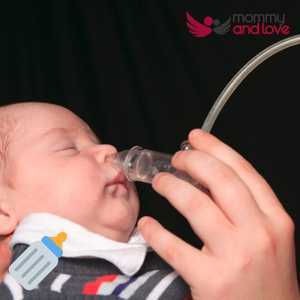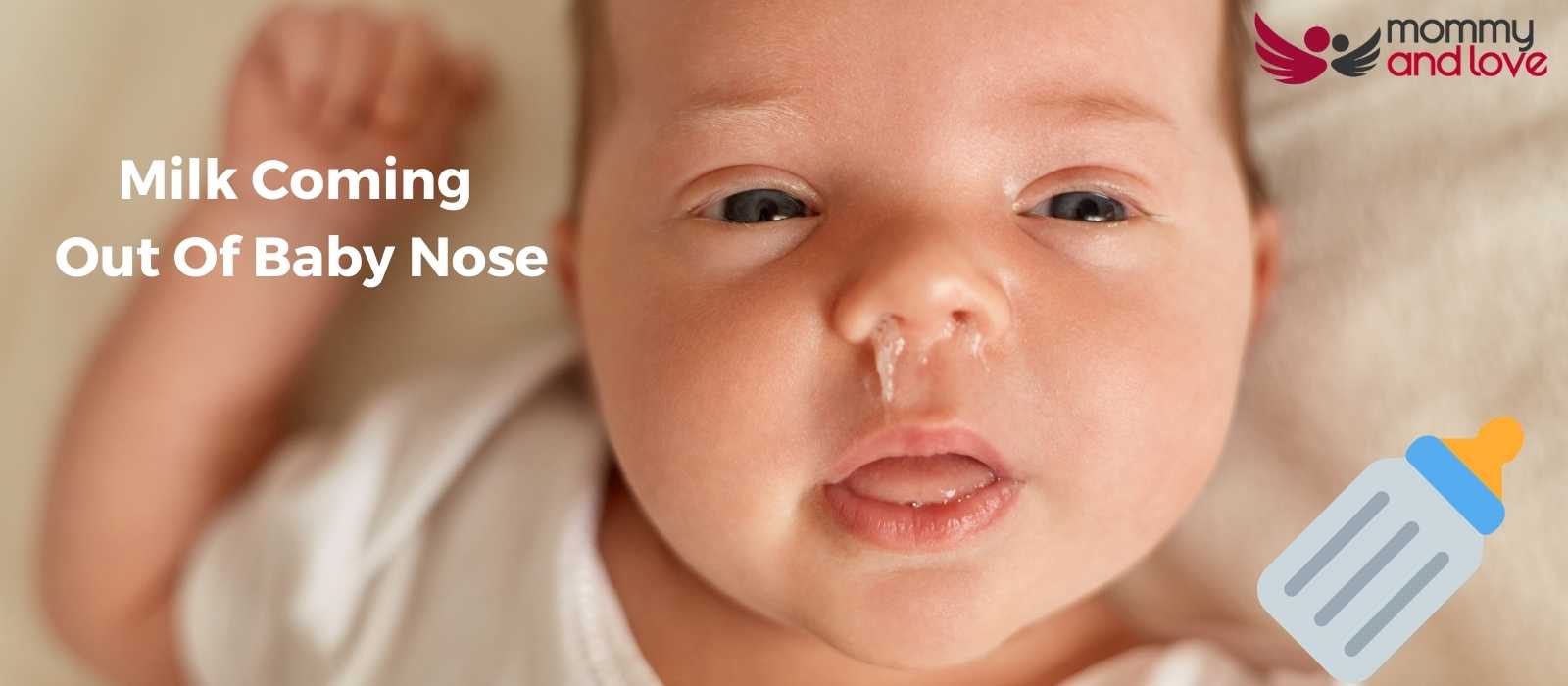It can be a scary sight when your newborn baby starts to sneeze and milk comes shooting out of his or her nose. Don’t worry, you’re not alone! This is a common occurrence for newborns, it is called nosesasal regurgitation and it’s usually nothing to worry about.
In this article, we will discuss the causes of milk coming out of a baby’s nose, is milk coming out of a baby’s nose is normal, as well as some tips for preventing it and treating it if it does occur. We’ve pulled together lots of baby advice for new parents on our ultimate new parent’s guide!
We hope that this information will help put your mind at ease when you first notice milk coming out of their nose and make taking care of your little one a little bit easier!
Nosesasal Regurgitation In Newborns
This can be alarming for parents, but it’s usually nothing to worry about. If your baby’s milk is coming out of their nose, it’s most likely due to a condition called nosesasal regurgitation. This is when ingested milk from the stomach is brought up and then flows out through the nose. It’s common in newborns and usually occurs after feedings.
There are a few things you can do to help reduce this:
– Burp your baby frequently during feedings
– Feed your baby in an upright position
– Keep your baby’s head elevated after feedings
If you’re concerned about your baby’s noseasal regurgitation, talk to their doctor. They can help you determine if there’s anything else going on that needs to be treated.
Why do babies spit up milk from their nose?

There are a few reasons why milk might come out of your baby’s nose. The most common reason is that your baby’s stomach is simply too full. When this happens, the milk can overflow and come out through the nostrils.
Another reason is too much wind when feeding.
Why does milk come down my baby’s nose?
Babies will regurgitate milk for a few reasons.
Oversupply
The first reason is oversupply. When your baby’s tummy is full, the milk can come back up. This usually happens after a feeding.
Oversupply can also happen if you have an overactive letdown reflex. This means that your body makes too much milk or lets down milk too quickly. When this happens, your baby can get overwhelmed and start to cry. The milk can then come out of his or her nose.
Letdown reflex is the release of milk from your breast. It is triggered by the sound of your baby crying, by thinking about your baby, or by touching your breast.
If you have an overactive letdown, you might notice that your baby chokes or coughs when he or she is nursing. He or she may also pull away from the breast and cry.
To help with an overactive letdown, try pumping milk before a feeding. This will help to reduce the amount of milk that is released when your baby nurses. You can also try nursing in a position that keeps your baby’s head above the level of your breast. This will help to slow down the flow of milk.
Oversupply is usually not a problem for long. Your body will adjust to how much milk your baby needs.
Swallowing excess air
Another reason milk might come out your baby’s nose is that he or she is swallowing too much air when drinking breast milk or formula. This can happen if your baby is crying a lot or if he or she has a stuffy nose.
To help with this, you can try burping your baby more often. You can also try to keep his or her head elevated when you are holding him or her.
You can also try to nurse your baby in a position that keeps his or her head above the level of your breast. This will help to slow down the flow of milk and give your baby time to swallow.
A stuffy nose can also make it hard for your baby to nurse. You can try using a saline nose spray to help clear your baby’s nose.
Winding
Winding is when you burp your baby to get rid of the air he or she has swallowed. It is important to do this after each feeding.
To wind your baby, hold him or her upright and pat or rub his or her back. You can also try lying your baby on your lap and gently rubbing his or her back.
If you are having trouble getting your baby to burp, you can try changing positions. You can also try walking around while you are holding your baby.
Baby Feeding Whilst Distracted
Another reason milk might come out of your baby’s nose is that he or she is being distracted while feeding. This can happen if there are a lot of people around or if there is a lot of noise.
To help with this, you can try to find a quiet place to feed your baby. You can also try to limit the number of people who are around during a feeding.
Baby Falls Asleep Straight After Feeding
Another reason milk might come out of your baby’s nose is that your baby falls asleep after a feeding. This can happen if your baby is very tired.
To help with this, you can try to wake your baby up after a feeding. You can also try to feed your baby when he or she is not so tired.
If you are having trouble getting your baby to wake up, you can try tickling his or her feet or blowing on his or her face.
Always put your baby to sleep on their back to prevent sudden infant death syndrome. Read our guide to safe sleeping here.
Weak muscles holding the lower esophagus closed
The final reason milk might come out your baby’s nose is that the muscles at the bottom of the esophagus are weak or they have an immature stomach valve. This can happen if your baby was born prematurely.
If your baby was born prematurely, he or she might need to be fed through a tube. This is because the muscles at the bottom of the esophagus are not yet strong enough to hold milk down.
Your baby will eventually outgrow this and will be able to eat like a full-term baby.
In the meantime, you can try to keep your baby upright for at least 30 minutes after a feeding. This will help the milk to stay down.
You can also try burping your baby more often
Motion Sickness
Remember to keep your baby calm and still after a feed. Baby’s stomachs are quite sensitive and any sudden movement or jerking could cause spit-up. You might want to avoid tummy time directly after a feed as well.
A baby’s spit up can also just be after a coughing or sneezing session.
If you notice that milk is coming out of your baby’s nose, the first thing you should do is check to see if his or her nose is full. If it is, you can try gently suctioning the excess milk out with a bulb syringe.
If your baby has a cold or allergies, you can try using a saline nose spray to help clear the blockage. You can also try placing a warm, wet washcloth over your baby’s nose to help loosen any congestion.
Spit Up Vs Vomit In Babies
One of the first things you will notice as a new parent is that your baby spits up. A lot. In fact, it’s estimated that babies spit up around 20 times a day! And while it can be alarming to see milk coming out of your baby’s nose, rest assured that this is perfectly normal behavior.
So what’s the difference between spit-up and vomit?
Spit up is usually just a small amount of milk that comes back up after a feeding. It’s often caused by overeating or swallowing too much air. Vomit, on the other hand, is a more forceful expulsion of stomach contents and can include solid food, mucus, and even blood.
If your baby has projectile vomiting, call your doctor immediately.
While spit up is totally normal, there are a few things you can do to help reduce the amount of milk that comes back up. Try burping your baby more often during feedings and avoid overfeeding them. You can also try holding them upright for a few minutes after feedings.
Treating Milk Coming Out of Baby’s Nose

If milk does happen to come out of your baby’s nose, there are a few things you can do to clean it up and help your little one feel more comfortable.
First, you will want to use a clean, soft cloth to wipe away any milk that is on your baby’s face.
Next, you can try using a bulb syringe to suction out any milk that is in the nose.
If your baby is having trouble breathing, you can try holding him or her upright with the head tilted slightly forward. This will help the milk drain out of the nose more easily.
Tips for Preventing Milk Coming Out of Baby’s Nose

There are a few things you can do to help prevent milk from coming out of your baby’s nose.
One thing you can do is make sure that your baby is in a sitting position when nursing. This will help ensure that the milk goes down the throat and doesn’t come back up through the nose.
If your baby has a cold or other respiratory infection, you can try using a saline nose spray to help clear the congestion. You can also use a bulb syringe to suction out any excess mucus.
Lastly, if your baby has the milk ejection reflex, you can try to catch it before it happens by offering your breast or bottle when you see another baby nursing.
You can also try to trigger the reflex yourself by gently rubbing your baby’s cheek or making a “shh” sound.
Nasal Regurgitation In Newborns Survival Guide
Regurgitation means that food is being transported back to the stomach. If no clinical cause has been established for nasal regurgitation of babies, then functional newborn regurgitation may arise. This is normal but scary especially for new mothers. If your baby has spit milk out his nose this is helpful for you.
Clean & Calm
Wipe away the drool and keep him as still as possible. Never put your baby down on his side to sleep, because this will disturb his airflow and may lead to spit-ups later. If your baby spits up through the nose, turn him around and pat him on the shoulder.
Use Flow Appropriate Nipples
If you’re bottle feeding, make sure that the nipples you are using are right for their age. Never use a nipple that is old or worn out (This is why you need to change the nipple often). Ensure the nipple is the right size for baby’s mouth, one too big and it may cause choking. Slow Flow nipples may suit your baby better and help babies stop spitting up.
Have shorter feeds
Remember that baby’s stomach is very small and bottle fed babies find it harder to digest formula compared to breast milk. This leads to a lot of spit up if he is over fed as they do have an immature digestive system, so little and often is better than big feed.
Don’t Delay Feeds
If you delay feeding, they are so hungry they tend to rush the food and end up swallowing air. This forces the milk out forcefully with a gulp, which can result in milk coming out of the nose
Distraction Free Feeds
When feeding your baby, keep them in a quiet room with no distractions.
Keep the Diaper and Clothes Loose
Avoid having an over tight diaper or tight clothing to avoid putting pressure on their stomach
Keep the baby upright after feeding
Keep the baby upright for a few minutes after feeding after he falls asleep. This allows the milk to drain from between the baby’s stomach and the mouth. This reduces the risk of spit-up later. If your baby falls asleep when feeding, it can be worth while to swap the bottle for a pacifier to help with the suck swallow reflex.
When should you be concerned about baby spit-up?
As detailed above, a baby spitting milk out through their nose is totally normal. However, if you notice any of the following signs you should consult your baby’s doctor. These could be indicative of a more serious condition:
-Your baby is projectile vomiting
-Vomit contains blood or looks like coffee grounds
-Baby is refusing to eat or drink
-Baby can’t catch their breath or has difficulty breathing
-There is green vomit
-Fever over 101 degrees Fahrenheit
-Baby is spitting up anything other than their food
-Baby is not gaining weight
Dehydration is also a cause for concern. If you notice that your baby is not urinating as often as usual, has dry lips or a sunken soft spot on their head, give your doctor a call.
If your baby is experiencing any of the aforementioned symptoms it’s best to play it safe and consult with their pediatrician or seek professional medical advice. Your baby’s pediatrician can investigate to see if there are any underlying causes.
The Bottom Line on Why is Milk Coming Out My Baby Nose
There are a number of reasons why your baby may be spitting up milk, and in most cases, it is nothing to worry about. However, if you notice any concerning symptoms, it is best to consult with your pediatrician.
In the meantime, use the tips we have provided to help reduce spitting up in your baby. A happy and healthy baby is what every parent wants, so do whatever you can to keep them comfortable and well-fed!




